Suchergebnisse für "Factsheet: Energietechnologien gestalten, die für alle sinnvoll und nutzbar sind"
Status Report on District Heating Systems in IEA Countries (2014)
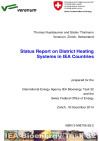
IEA Bioenergie Task 32
Thomas Nussbaumer, Stefan Thalmann
Herausgeber: Verenum und Schweizer Bundesamt für Energie
Englisch, 48 Seiten
Downloads zur Publikation
Cepheus Cost Efficient Passive Houses As European Standards
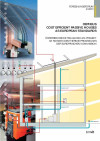
Österreichische Teilnahme am Projekt im Rahmen des THERMIE-Programms der Europäischen Kommission
Forschungsforum
2/2001
Herausgeber: BMVIT
Deutsch, 6 Seiten
Downloads zur Publikation
Aktoren unterstützte, adaptive Verbrennungsoptimierung zur Feinstaubreduzierung
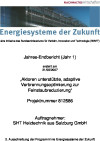
Dipl.-Ing. Herbert Hartl, MBA
Herausgeber: Bundesministerium für Verkehr, Innovation und Technologie
Downloads zur Publikation
Aufarbeitung von Filterrückständen bei der Bierherstellung zur Gewinnung einer innovativen pharmazeutischen Substanz
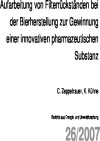
Schriftenreihe
26/2007
C. Zeppelzauer, K. Kühne
Herausgeber: Bundesministerium für Verkehr, Innovation und Technologie
Deutsch, 43 Seiten
Downloads zur Publikation
"gugler! build & print triple zero" - subproject 2: building with recycros
Building with recycros is working out basics in order to close the cycle of materials in the building sector as well as to increase the usage of recycled materials (recycros). The existing material cycles in the building sector are going to be analysed. Furthermore, there will be a catalogue presented, covering the actual situation of which materials are used in today´s engineering and how the waste is treated. The project will be completed with a summary of results and a proposal of concrete materials and constructional systems for the building project gugler.
Fibre composites with natural adhesive
Developing of suitable bonding agents, fibres and processing technologies for the production of form stable fibre composites made of natural components. Production of prototypes like boards and moulded parts. Material testing.
Energieforschungsstrategie Österreich

Making the Zero Carbon Society Possible!
Michael Cerveny, Johannes Gadner, Anton Graschopf, Michael Paula
Herausgeber: Rat für Forschung und Technologieentwicklung
Deutsch, 56 Seiten
Downloads zur Publikation
Erstellung eines Konzeptes zur Entwicklung der "Dienstleistung Schmierung" zur Maximierung der Anlagenlebensdauer auf Basis von Ionischen Flüssigkeiten als Spezialschmiermittel
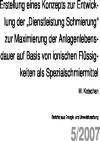
Schriftenreihe
05/2007
DI Dr. Michael Kotschan MBA
Herausgeber: Bundesministeriums für Verkehr, Innovation und Technologie
Deutsch, 43 Seiten
Downloads zur Publikation
Network material ecology for hospitals
The use of sustainable building materials is a key issue for sustainable development of the building sector. Emission free indoor air, minimized embodied energy of construction materials and health risk for construction workers are three main aspects. Between five hospital operators in Austria, Germany and Switzerland a practical exchange of experience focused on material ecology will be initiated and moderated.
RepaMobil
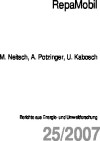
Abbau von Markthemmnissen bei haushaltsnahen Produkt-Dienstleistungs-Systemen, insbes. Reparaturleistungen, durch Servicestellen an Standorten mit hoher Kundenfrequenz
Schriftenreihe
25/2007
M. Neitsch, A. Potzinger, U. Kabosch
Herausgeber: Bundesministerium für Verkehr, Innovation und Technologie
Deutsch, 158 Seiten
Downloads zur Publikation
FABRIK der Zukunft Hintergrundband Teil 1, Auflage 1
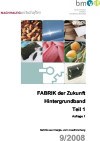
Sammlung von Projektergebnissen aus der Programmlinie FABRIK der Zukunft
Schriftenreihe
09/2008
Hans-Günther Schwarz, Mag. Sabine List
Herausgeber: Bundesministerium für Verkehr, Innovation und Technologie
Deutsch, 206 Seiten
Downloads zur Publikation
Interregional Logistics- and Procurement Network for Forest Fuel in Austria
A concept for a cooperative forest fuel supply chain network for a large part of Austria (regions of Salzburg, Upper Austria, Lower Austria, Vienna) is developed in order to minimise transport-, storage- and total system costs while simultaneously increasing supply guarantee for the plants.
"Building of Tomorrow" on the road - knowledge transfer of the results from "Building of Tomorrow" to existing traineeships
Knowledge transfer of the programme "Building of Tomorrow" to specialists on universities, advanced technical colleges, polytechnics, construction academies, administration academies. Themes: Energy, Construction and Building Physics, Ecology and Architecture and Sociology.
UrbanEnergyCells - Requirements for the implementation of energy cells in future energy system designs
The transformation of the currently hierarchical electricity system into a renewable, decentralized electricity system poses major challenges for the actors in the energy industry and society. Most of the installed decentralized renewable energy sources are installed in rural areas, due to easier legal implementation and shorter decision-making pathways. However, the energy density in urban areas is significantly higher, resulting in a transport of electrical energy to the consumption centers.
Haus der Zukunft in der Praxis Themenworkshop 12: Innovationen im großvolumigen Wohnbau
23. Okt 2006
FFG, Sensengasse 1
1090 Wien, AT
Themenworkshop aus der Reihe Haus der Zukunft in der Praxis
Ecological restoration of a listed building with passive house technologies
Ecological exemplary reconstruction of the "Haidenhof"-building, Bad Ischl, Upper Austria. Building refurbishment with respect to monumental protection and newest passive house technologies. Reorganisation of the former residential building to an academy of arts and culture.
IEA SHC Task 59/EBC Annex 76: Deep Renovation of Historic Buildings - Towards lowest possible energy demand and CO2 emission (nZEB)
The goal of Task 59 was to document international best practice examples (knowledge base), develop a multidisciplinary planning process, and develop holistic retrofit solutions for historic buildings. As a knowledge base, the Historic Building Retrofit Atlas (www.HiBERatlas.com) emerged from the project. In the HiBERatlas more than 55 best practice examples are documented. In addition to the management of Subtask A (Knowledge Base) and Subtask C (Conservation compatible retrofit solutions & strategies), innovative technical and organizational retrofit solutions, which have already been applied in national demonstration projects and tested in practice, have been incorporated and further developed through the Austrian participation.
Beacon of innovation gugler cross media, ecoeffective zero energy cross media enterprise featuring zero-emission, zero energy, zero waste
The aim of the flagship project is a new dimension of sustainability (cradle to cradle, ecoeffective zero energy enterprise) for business operation and building, which means zero emission, zero energy, zero waste. This will be shown on the basis of a beacon of innovation: Gugler GmbH, a modern sustainable media services enterprise (traditional print and new media) will extend their current building from about 2100 square meters and about 90 employees to about 5,000 square meters.
baubookPlus - Expansion of an extensive knowledge database of sustainable buildings
By the foundation of the baubook GmbH in 2008 the two databases of building products "öbox" and "ixbau.at" have been merged. The new database baubook was expanded. Essential functions (central product declaration, decentral quality management) and fields of products were added.
BuildReUse ‐ 100 percent re‐use and recycling in buildings with short usage cycles
Some buildings, such as supermarkets or office buildings, are often demolished and rebuilt after a few years or at least have their interiors changed, turning large quantities of building components into waste. The BuildReUse project aims to develop circular economy concepts for these buildings and to promote the necessary change in the construction industry.
